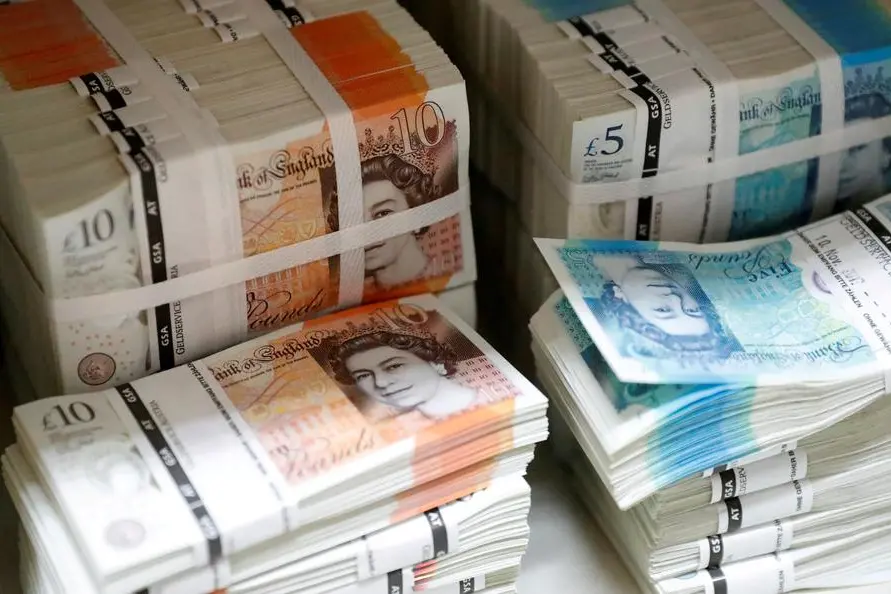PHOTO
LONDON - Britain's interest rate horizon skyrocketed this week on another alarming inflation reading that some fear entrenches the economy as outlier among Western peers - and yet the pound didn't know whether to laugh or cry.
Unlike its dire reaction to UK bond market ructions surrounding last September's government budget farce, when it lunged to near record lows of the pandemic, sterling has held up well so far against a similarly seismic shift in the government bond, or gilt, market this week.
While it lost ground to a resurgent dollar - which was infused by a mix of debt ceiling anxiety, hawkish Federal Reserve soundings and an AI-driven dash for U.S. tech stocks - sterling flatlined on the more telling euro cross rate and its overall index held the line too.
On the flipside, the fact that it gained nothing on the euro despite a 30 basis point increase in the premium on 10-year gilt yields over German benchmarks was equally telling and made many wonder whether a different shade of risk premium is re-emerging.
Some feel that's less the unkindly-dubbed 'moron premium' related to the political policy missteps of eight months ago than a longer-term inflation insurance fee at least partly related to the structural hit from Brexit.
"It is a very ugly look for a currency when a huge leap in more hawkish central bank anticipation fails to support the currency," opined Saxo's currency strategist John Hardy, referring to the near half-point leap in money markets' pricing of peak Bank of England interest rates this week to near 5.5%.
"The UK is dogged by supply-side shortages, particularly in labour, that are the chief Brexit 'gift'," he said, adding a resultant stagflation risk for the economy continues to leave fiscal and monetary policy in a bind.
To be sure, the April inflation data hit the UK debt market like a thunderbolt.
While the headline consumer price inflation rate dropped to 8.7% from 10.1% in March, as energy prices ebbed, that was still far higher than forecast and core inflation rates hit their highest in 31 years at just under 7%.
What's more, relief about a return to single-digit headline inflation was challenged by other cuts of the number.
The National Institute of Economic and Social Research (NIESR) calculated that its 'trimmed mean' inflation measure, which excludes 5% of the highest and lowest price changes, rose to a new cycle high of 10.2% from 9.9% the prior month.
"These figures suggest that we have yet to see a meaningful turning point in underlying inflationary pressure," the NIESR concluded.
And a chief concern for many households is ongoing annual food price inflation still near 20%.
Here again, Brexit seems to rear its head.
Departure from the European Union has accounted for about a third of the increase in food bills for households since 2019, researchers from the London School of Economics and other universities said on Thursday.
The study found that between January 2022 and March 2023, the price of food products that were exposed to Brexit increased by about 3.5 percentage points more than those that were not.
REHABILITATION ON HOLD
The full picture sent BoE rate expectations, gilt yields and the UK mortgage market into a rigor - with two-year swap rates underpinning mortgage lenders' financing costs and mortgage pricing shooting up around 50 basis points in a week.
The 10-year gilt yield leapt by more than 50bp to almost 4.4% - the highest since the BoE was forced to intervene to buy government bonds in the wake of last September's budget shock and related pension fund blowups.
As to whether the pound should cheer or run at this unfolding scenario, Deutsche Bank economists reckon the main reason for sterling's relative resilience is that real, inflation-adjusted, UK yields have actually been rising sharply relative to German equivalents.
Using 5-year real yields from the index-linked bond market, that premium jumped almost 40bp this week to its highest since last October.
The big question is whether that buffer is now deemed necessary again just to hold the pound steady - due to political policy doubts, BoE policy commitment or even Brexit effects.
And a further erosion of British economic competitiveness due to comparatively higher long-term inflation risks undermining a currency only just rehabilitated this year in the eyes of many investors as the economy surprised and defied forecasts of deep recession.
Earlier this month, Germany's Berenberg argued the pound had also benefited from a return of relatively pragmatic, centrist leaders at the helm of its two biggest parties going into 2024's election.
"After six years of damaging chaos, which badly hurt the UK's reputation as a well-run advanced economy, this is welcome news," the bank's economist Kallum Pickering wrote.
But inflation dynamics may yet demand outsize compensation.
"We don't see such a cross-asset premium (like September 2022) returning to UK markets, but do think it more likely than not that the currency starts to weaken from here if the nominal yield repricing fails to keep up with the reassessment of the inflation outlook," Deutsche Bank's Sanjay Raja and Shreyas Gopal told clients.
The opinions expressed here are those of the author, a columnist for Reuters.
(Writing by Mike Dolan, Editing by Susan Fenton)





















